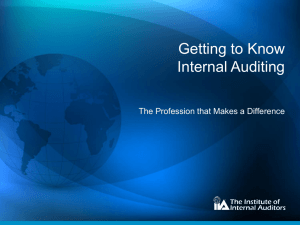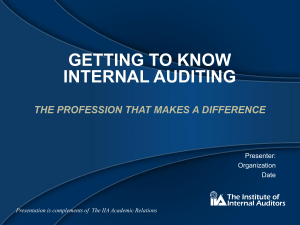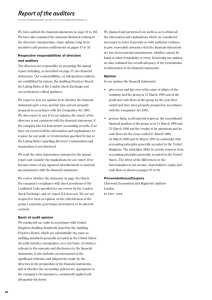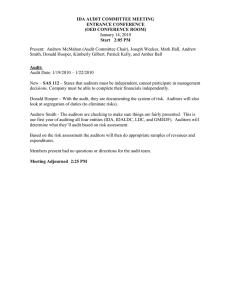Getting to Know Internal Auditing - The Institute of Internal Auditors
advertisement
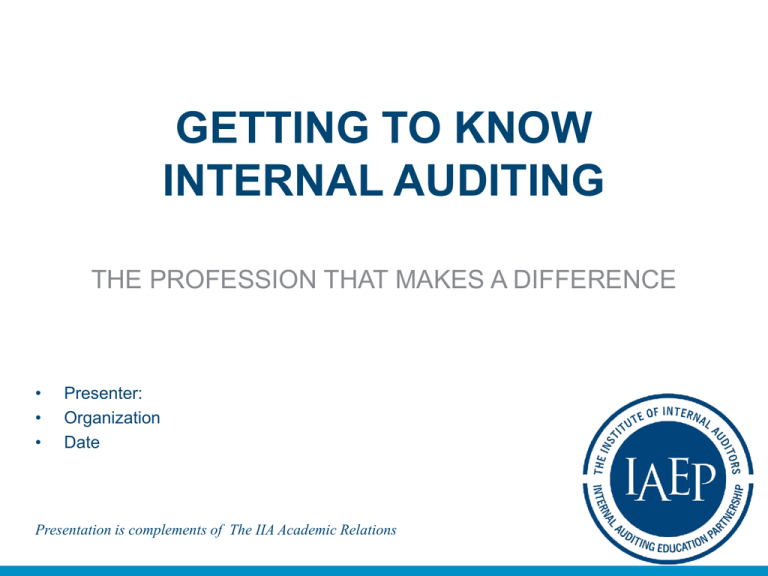
GETTING TO KNOW INTERNAL AUDITING THE PROFESSION THAT MAKES A DIFFERENCE • • • Presenter: Organization Date Presentation is complements of The IIA Academic Relations INTERNAL AUDITORS ASSESS RISKS… • To help keep bad things from happening • To help assure good things can happen • To help management understand – Where their risks are – Whether the risks are under control – Whether the risks are worth taking FINDING RISK IS NOT ENOUGH • Internal auditors evaluate the controls that help organizations manage risks – Are controls in place? – Do the controls work? – Are additional controls needed? – Are there unnecessary controls? – Are the controls cost-effective? EFFECTIVE GOVERNANCE Board of Directors Internal Audit External Audit Management MAINTAINING INDEPENDENCE: DUAL REPORTING RELATIONSHIPS • About 80 percent of Chief Audit Executives (CAEs) report functionally to the Audit Committee/Board of Directors – Independent from audited activities – Wide authority • Most common administrative reporting relationship is to the President/CEO MEETING DIVERSE STAKEHOLDER NEEDS Key Stakeholders Secondary Stakeholders Tertiary Stakeholders • Audit committee/ board • CEO • CFO or individual to whom CAE reports administratively • Potentially, other chief officers • Other business unit executives • External auditors and regulators • Investors and creditors • (Government audit) citizens and taxpayers • Employees and retirees • Investment analysts • Potentially, the general public INTERNAL AUDTORS • • • • • • • Find out what’s working and what’s not Keep an eye on the corporate climate Look at the organization with fresh eyes Look beyond the financial statements Advocate improvements Raise red flags Tell it like it is AUDITORS TELL IT LIKE IT IS • Keep senior management aware of critical issues • Ensure factual communications of financial, operational and compliance data • Make suggestions based on knowledge of operations throughout the organization WHAT WOULD YOU SAY… • If someone asked you whether or not their organization needed internal auditors? WHEN DOES A COMPANY NEED AND INTERNAL AUDIT FUNCTION? • Internal audit is not legally required in the U.S. – Exceptions: NYSE-listed corporations and a few specific industry/government requirements • Required in some countries • Every organization, regardless of its size, should have some type of internal control system/process • The IIA believes that an organization is best served by a fully resourced and professionally competent internal auditing function WHAT WILL AN INTERNAL FUNCTION ACCOMPLISH? • Will it reduce liability or help control risks? • Will it free management to focus on core mission? • Will it improve the accuracy of financial and operational information? • Do we need a second opinion? • Can we improve service delivery? • Will it improve financial results? INTERNATIONAL PROFESSIONAL PRACTICES FRAMEWORK • Mandatory Guidance – International Standards for the Professional Practice of Internal Auditing – Definition of Internal Auditing – Code of Ethics • Strongly Recommended – Position Papers – Practice Advisories – Practice Guides Questions?

